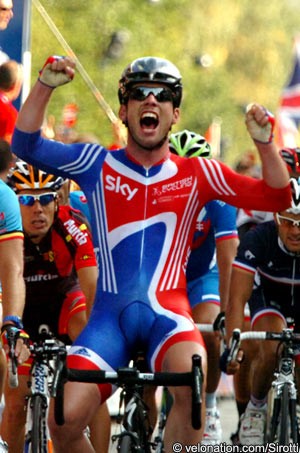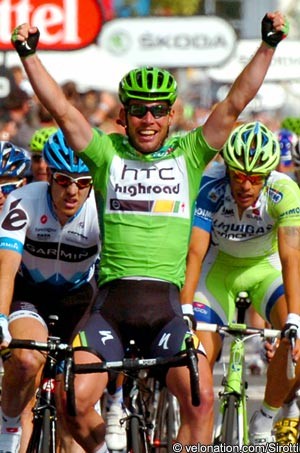World champion looks ahead to 2012 and the London 2012 road race
 Mark Cavendish was the overwhelming favourite for this year’s World championships in Compenhagen, Denmark, and he won; he’s overwhelming favourite for Olympic victory in London next summer and, with his transfer to Team Sky, appears to be in the best environment to win there too. At the presentation of the Right to Play 2012 ride, the Manxman explained, to a mixed audience, a number of the factors that could influence that race.
Mark Cavendish was the overwhelming favourite for this year’s World championships in Compenhagen, Denmark, and he won; he’s overwhelming favourite for Olympic victory in London next summer and, with his transfer to Team Sky, appears to be in the best environment to win there too. At the presentation of the Right to Play 2012 ride, the Manxman explained, to a mixed audience, a number of the factors that could influence that race.
“It’s a misconception that my bit only comes at the end of a race,” he explained about the role of a sprinter. “I have to be in the best condition I can be for the sprint. It’s not like I’m hanging on to someone the whole way and then sprint at the end; I have to be there; I have to be in the best condition, and that’s about looking after yourself; making sure you’re not using extra energy; not riding in the wind, making sure you’re in someone’s slipstream; make sure you’re in the front on the corners.
“We’re probably some of the most active people in terms of thinking and doing things, you know,” he added. “People might be physically more active when they’re riding on the front, but guys like me are always having to think about where we are; thinking about everything.”
Although it might be his name that appears on the result sheet, Cavendish is only too aware that it is a nine-man effort to get him over the line first.
“We’re riding for a team,” he explained. “Just like footballers are playing for a team; we’ve got strikers that are good and everyone else has to stop us.
“Everybody’s paid,” he continued, “and our job – if you break it down into what any professional sport is commercial. The sponsor pays money to have their image displayed, and our job as cyclists is to get the image displayed; to get the sponsors logo displayed; and there’s no better way to do that than to cross the finish line with your hands in the air.
“So our job – the nine riders in something like the Tour de France – is to get our sponsors logo displayed, so we have to find the best way for the group of nine to do that. The result sheet will say [Mark Cavendish] but that’s our job and most guys know it.”
HTC-Highroad – where Cavendish has spent his entire professional career – is folding at the end of the year, due to being unable to secure a replacement sponsor, and the Manxman is making the long-expected move to Team Sky.
Obviously, there are some mixed feelings for Cavendish, but the fact that he will be joining a number of familiar faces at Sky – which shares a lot of resources with British Cycling – make the move an exciting one.
“I’m going to miss some great people actually,” he said. “I’m lucky that I’ve spent five years with the same team, and I’ve been with some great riders. I’m going to miss a lot of them, but at the same time I’m looking forward to working with everyone. There’s some people I grew up with, with riders who are friends, with management that I worked with since I was a kid.
“Like anything it’s a new challenge, and you’ve got to look at how it is, and I’m super-excited,” he added. “It’s going to be a really, really great time I think.”
Despite becoming the first British man to become World road champion since Tom Simpson in 1965, Cavendish is under no illusions as to being able to defend that title any time soon.
“No course suits me until after 2014, so I don’t know,” he explained. “It depends on the courses.”
Right to Play and the Olympic road race
 Right to Play has been the officially endorsed charity of the HTC-Highroad team for some time, but Cavendish – like a number of his teammates – has made the extra step to become an Athlete Ambassador.
Right to Play has been the officially endorsed charity of the HTC-Highroad team for some time, but Cavendish – like a number of his teammates – has made the extra step to become an Athlete Ambassador.
“It’s a known fact that everything I say is from the heart; everything I believe in is from the heart; I don’t do things for attention, commercial gain, or whatever,” he explained. “I first met Right to Play when T-Mobile changed to Highroad [in 2007 – ed] and Right to Play came along. I wasn’t interested in putting my name to a charity or anything, but I bought into Right to Play straight away for what they do.
“So it wasn’t just a matter of them working on the team that I was working on, I wanted to know what; and I’ve always been a massive fan of what they do to support kids. I think it’s just so easy sometimes to look at a charity and you can’t really relate to it… but with Right to Play I could. Helping underprivileged children through sport is a really good thing to do.
“There’s a story I heard; I think it was in Sierra Leone, and they went to a little girl whose parents had both been killed, and she hadn’t talked for a year. I can’t remember who it was, but they just rolled a ball to her; she looked at the ball, looked up, and she pushed the ball back; then he pushed it back again, she looked and she pushed it back. It kept on for a while; it wasn’t just after that one thing but in time she was talking, and she just integrated back into life.”
“You can actually see what it’s doing, you can see that things can be helped through sport, and that’s why – I didn’t buy into it – I could see the benefits of it, and the positive influence it had.
“I’ve been a massive supporter ever since; on a personal level, not just through the team.”
With the Olympic Games being by far the biggest event for many British riders next year, Cavendish is the hot favourite; just as he was in Copenhagen. Despite the enormity of the occasion though, the Manx sprinter is trying to keep a professional head and doesn’t expect to get too carried away with the hype.
“It’s hard to know, it sounds un-flamboyant but it’s a job that I have to do,” he said. “Not just a job, but I’ve set targets to win the Olympics, and there’s a massive chance for me to win the Olympics; there’s probably a better chance than anyone has to win the Olympics. It’s a simple as that; as fundamental as that.
The biggest obstacle to a Cavendish gold medal is likely to be the nine circuits in the middle of the race, which will scale the climb of Box Hill each time. While hardly anything in isolation, the accumulative affect of nine times up the relatively shallow hairpinned road is likely to cause trouble for a sprinter, who notoriously dislikes hills.
“It’s the challenge, to be honest,” he agreed. “We did the Olympic test event in August and went up Box Hill twice, and I won. But Box Hill twice is nothing, you know, especially with 40km to ride back in to the Mall. Five times it’s going to start feeling like a climb, but nine times is a lot, you know, but it’s real doable.
“It’s going to be hard, but that makes it even more worthwhile if we win.
“So it’s not really the severity of Box Hill,” he concluded, “it’s just the nine-times up that’s the problem.”